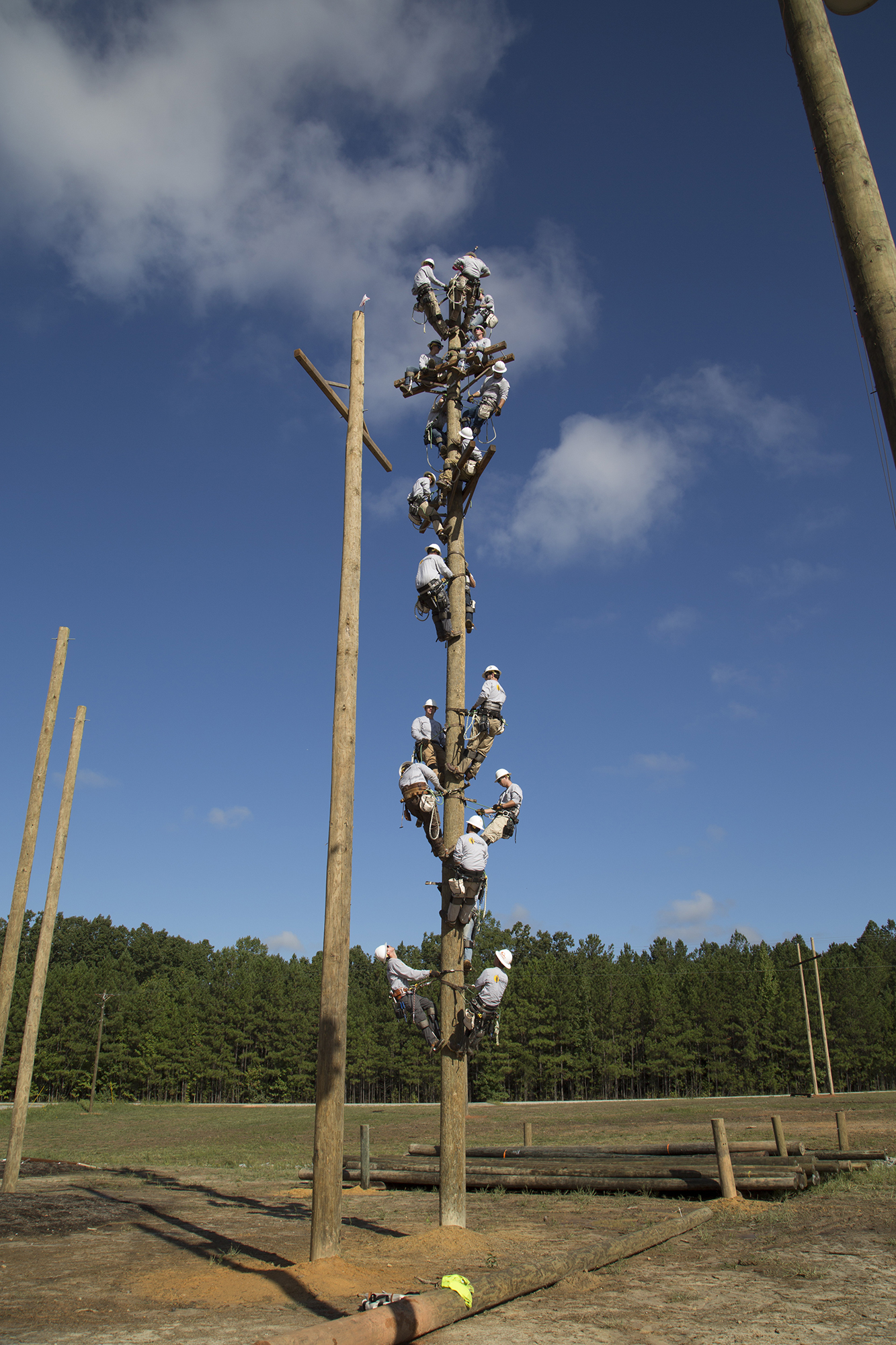Lineworker Training School
BLACKSTONE, Va.—How many budding electric utility lineworkers can you fit on a power pole? Answer: An entire graduating class.
An array of 19 students, all smiles, straddled a 65-foot utility pole Sept. 23 in an exhibition of skills they learned during their 11 weeks at the new Power Line Worker Training School in rural Virginia.
“I wasn’t scared of heights when I started the school—it was just a different feeling,” said Gage Clary of South Hill, Virginia, just three months removed from his high school graduation.
“I thought I’d be a little nervous, but I learned I was not scared of heights at all. I really like this. It’s always something new every day. Now it’s time to find a job and go to work,” he said.
Jobs are what the school is all about. Based at Fort Pickett in Blackstone, about an hour southwest of Richmond, it represents a novel partnership between Southside Virginia Community College and electric cooperatives.
“Rural America needs job opportunities and it needs people who are prepared to fill those jobs when they are available. We do not have that right now,” said Jeff Edwards, CEO of Southside Electric Cooperative in Crewe.

“This gives these kids a really good opportunity to make a career—not just have a job but make a career,” said Edwards, adding that his co-op might hire a couple of the new graduates.
Dr. Al Roberts, president of Southside Virginia Community College, said the Virginia, Maryland & Delaware Association of Electric Cooperatives and its members have helped the school craft a program that addresses an industry need—an expected wave of lineworker retirements.
“Other programs are challenged in terms of generating student interest— not because there aren’t potential jobs or jobs in other areas of the commonwealth—but because there are no jobs related to those programs right here in Southside Virginia,” he said.
“So the key is to develop programs that match the jobs that are available,” he added, calling the school “a perfect example of what can happen when industry is pushing.”
The school is off to a great start—all 11 members of the first class that graduated in May have jobs and several in the newest class had interviews lined up before they climbed up the celebratory pole.
Regina Hall of South Hill said she had reservations about letting her son Jacob enter the school, what with maternal concerns about heights and live voltage. As she watched him zip up and down a pole at graduation, she was ready to let go.
“I’m glad he picked this as opposed to a four-year college like some people do, because if they’re from a small town like South Hill they’re going to come back and try to find a job and have a hard time,” she said. “I think he’s definitely doing something he has a passion for.”
That’s exactly the way Jacob felt.
“It makes me proud in the evening time when I go home. I know that I’ve done something. I’d rather be tired when I go home,” he said.
“We’re all like brothers now, like we’ve been knowing each other all of our lives. It’s like you work as a team. It’s like a brotherhood when you go into the line work.”
About 175 family members, friends and co-op officials attended the graduation ceremony, packing the officers club at Fort Pickett as beaming students displayed their diplomas.
“I was nervous,” confessed Todd Doggett of Ruther Glen, Virginia, whose son Troy was among the graduates. “I don’t know how they learned so much so quickly. It’s just amazing.”
Edwards said graduation day meant a lot to him since the training center is the outgrowth of his co-op’s popular “Day in the Life of a Lineman” program, which gives high schoolers a firsthand look at the line worker career.
“I’ve known some of these kids since they were in the fourth grade. My son has played baseball with quite a few of them over the years. So to watch them progress from being a fourth-grade student to now being over 6-foot-3 and climbing a 65-foot pole, it’s emotional,” he said.
“It’s very impressive to me and I couldn’t be more proud of them.”
Check out our RE magazine feature on the Power Line Worker Training School.
Our story on “Day in the Life of a Lineman” is the most-read story on any NRECA site and now it’s updated for Electric.coop.
Steven Johnson is a staff writer at NRECA.